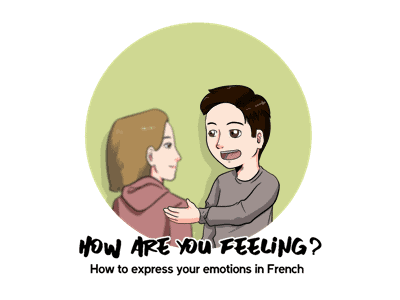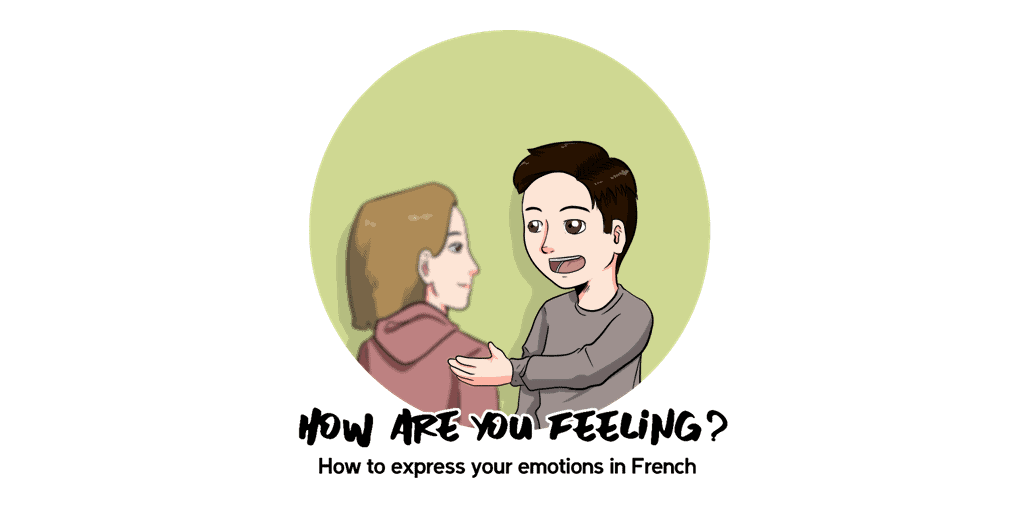How Are You Feeling? How to Express Your Emotions in French

When someone greets you in any language, it’s almost impossible not to follow up with the question about how you’re feeling. It may be a bit awkward if you become silent after someone greets you with “Bonjour,” so it’s best to study up on letting people know how you feel.
There are several ways to express your feelings and emotions in French, so we’ll cover the basics.

Asking and Telling How You Feel in French
There are a few ways to ask someone how they’re feeling, but it’s important to keep in mind whether you’re speaking to someone formally or informally.
The most common phrases are as follows.
« How are you? » in French
| Comment ça va ? | How are you? (informal) |
| Comment allez vous ? | How are you? (formal) |
The informal form is preferred when talking to friends, family, and peers. Use the formal form when communicating with strangers, your superiors, or elders.
In response, you can say:
| Je suis… | I am… |
| Il est… | He is… |
| Elle est… | She is… |
*Keep in mind that when referring to more than one person, you will change the verb est to sont to agree with the subject.
See also:
French Cheat Sheet: Basic French Questions and Answers
To talk about your feelings, or les sentiments, in French, you will frequently use the verb: se sentir. The verb has various forms to agree with the person using it and how many people you’re referring to.
To explicitly ask about someone’s feelings, you can ask, “How do you feel (informal)” or “How are you feeling (formal). In french, you can use the following phrases:
« How do you feel? » in French
| Comment te sens-tu ? | How do you feel? (informal) |
| Comment vous sentez-vous ? | How are you feeling? (formal) |
In response, you will use the same verb as follows:
| Je me sens… | I feel… |
| Il se sent… | He feels… |
| Elle se sent… | She feels… |
Être de bonne humeur (To be in a good mood)
On our best days, we’ll be able to happily respond to the question in bonne humeur, or a good mood. Whether it’s the case or not, when speaking to strangers, we tend to respond the same way to avoid any further questions or explanations.
There are lots of ways to express your good mood and to varying degrees of happiness.
Some of the most common ways to describe a good feeling are:
| content(e) or heureux (or heureuse) | happy |
| emballé(e) | excited |
| ravi(e) | delighted |
| joyeux (joyeuse) | cheerful |
| ébahi(e) | amazed |
*Adjective describing a female subject noted in parenthesis
For example, you can say “Je suis content” for “I am happy,” or “Elle se sent gaie,” for she feels cheerful.
The critical thing to note when speaking and writing French is to use the correct adjective with the corresponding subject so that the person you’re speaking to knows exactly who you’re talking about!
Positive Emotions
| assuré(e) | confident |
| tranquille | calm |
| abasourdi(e) | stunned |
For example, some of the phrases you might say are:
| Il est confiant | He is confident |
| Je me sens tranquille | I feel calm |
| Ils sont abasourdis | They are stunned |
Ideally, you’d be using these phrases for most of the time you’re communicating in French – perhaps while traveling in France. Once you understand the overall sentence structure of talking about how you feel and your emotions, you can apply most adjectives to the end as you continue to grow your French vocabulary.
Être de mauvaise humeur (To be in a bad mood)
As much as we’d like to be, it’s hard to remain in a good mood forever. There’s always certain circumstances that happen in our life or just “one of those days” when we’re feeling a bit down.
Just as there are several ways to express your good mood, there are just as many ways to talk about being in a bad mood, or mauvaise humeur:
Negative Emotions in French
| triste | sad |
| malheureux (malheureuse) | unhappy |
| fâché(e) or en colère | angry |
| énervé(e) | annoyed |
| navré(e) | sorry (distressed) |
| solitaire | lonely |
Some of the phrases you’d use for communicating you, or someone else, is in a bad mood are:
| Je suis triste | I am sad |
| Elles sont énervées | They are annoyed (when referring to a group of females) |
| Il se sent solitaire | He feels lonely |
Sometimes, our bad mood can show in our appearance even without having to communicate it verbally. If someone notices you look a bit down, they may ask you, “Qu’est-ce qu’il y a,” or “what’s wrong?”
Our bad mood can be attributed to events, or daily situations that may have us down temporarily or for the entire day. Some of the more abstract bad mood words to describe how you feel include:
| honteux (honteuse) | ashamed |
| ennuyé(e) | bored |
| désorienté(e) | confused |
| confus(e) or gêné(e) | embarrassed |
| inquiet (inquiète) | worried |
| pressé(e) | rushed |
| fatigué(e) | tired |
Let’s take a look at a few phrases to put them in the context of how you’d use them in a sentence:
| Elle se sent désorientée | She feels confused |
| Je suis fatigué(e) | I am tired |
| Ils sont ennuyés | They are bored |
Some of the words used to describe a bad mood can be interchanged if the emotions and feelings are closely related. For example, “énervé” can be used to express a feeling of annoyed, bored, or irritated. Also, “confus” can describe either embarrassed or confused.
Understanding the context and nonverbal cues can let you know exactly which emotion someone is trying to communicate.
To wrap up, here is a list of French emotions vocabulary.
30 French vocabulary words and phrases for describing feelings and emotions
| Comment ça va ? / Comment allez vous ? | How are you? |
| Comment te sens-tu ? | How do you feel? |
| Qu’est-ce qu’il y a ? | What’s wrong? |
| Les sentiments | Feelings |
| Heureux (heureuse) | Happy |
| Triste | Sad |
| Emballé(e) | Excited |
| Ébahi(e) | Amazed |
| Désorienté(e) / confus(e) | Confused |
| Surprise(e) | Surprised |
| Enthusiastic | Enthusiastic |
| Inquiét | Worried |
| Pressé(e) | Rushed (in a hurry) |
| Nerveux | Nervous |
| Malade | Sick |
| Occupé(e) | Busy |
| Fatigue(e) | Tired |
| Calme / tranquille | Calm |
| Ennuyé(e) | Bored |
| Fâché(e) | Angry |
| Jaloux (jalouse) | Jealous |
| Anxieux (anxieuse) | Anxious |
| Choqué(e) | Stunned |
| Indifférent(e) | Indifferent |
| Horrifié(e) | Horrified |
| Ravi(e) | Delighted |
| Confiant(e) | Confident |
| Joyeux (Joyeuse) | Cheerful |
| Bonne humeur | Good mood |
| Mauvaise humeur | Bad mood |
Conclusion
How about you? How are you feeling? Let us know in the comments below how you’re feeling today!




